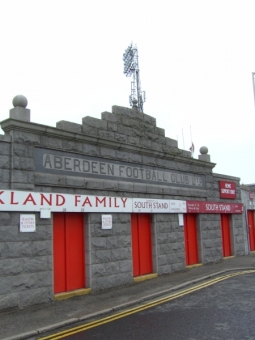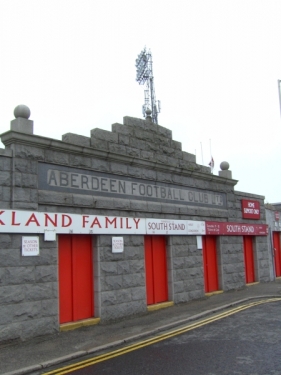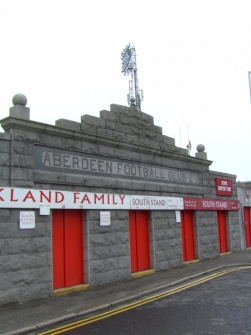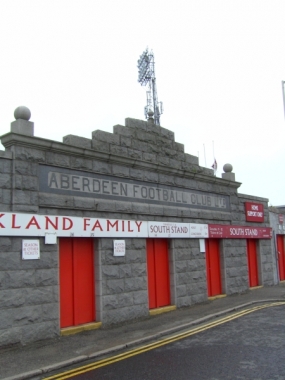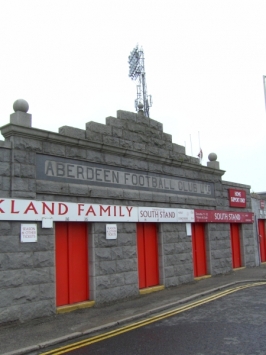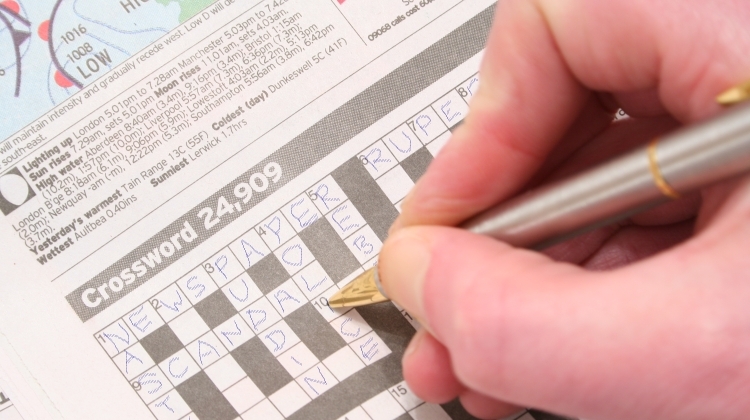Back to back wins, a five-figure home attendance creating a good atmosphere, and a team physically dominating a match to a comfortable victory…surely this can’t be the Aberdeen FC of this season we’re talking about?! Philip Sim reports from Pittodrie.
Last time out against Dunfermline, Aberdeen created innumerable chances and only visiting stopper Paul Gallacher prevented the match ending with a cricket score.
Dundee United were expected to provide a much stiffer challenge than the SPL new boys, but in truth the Dons did not even have to play as well as they did against the Fifers to record a comfortable victory.
Dusan Pernis is normally a solid, reliable goalkeeper, but he made a bad error in United’s last match against Motherwell, and he seems low on confidence.
He did very well to parry Rory Fallon’s header seconds before Kari Arnason stabbed home the opener, but his kicking was all over the place and even Andrew Considine will be wondering how his trundling effort crept in for Aberdeen’s third.
The visitor’s deficiencies didn’t start or end at the back however.
United lost an entire midfield of talented players over the summer, and have tried to replace them with kids and the extremely average John Rankin. By contrast Aberdeen’s summer signings Kari Arnason and Isaac Osbourne had little trouble in taking the game by the scruff of the neck and absolutely controlling proceedings in the middle of the park.
Osbourne in particular didn’t miss a tackle, and his graft and tidy use of the ball left Aberdeen dominating the midfield, despite Fraser Fyvie and Rob Milsom having relatively quiet games.
At the back, the Dons were if anything even more impenetrable. United captain Jon Daly must think of Pittodrie as a fairly happy hunting ground, but he barely got a touch of the ball in this match with Youll Mawene and Andy Considine winning everything in the air and on the deck. Each also popped up with a goal at set pieces – another mark of how the Dons totally won the physical battle against opponents who are no lightweights themselves.
Up front, Fallon and Scott Vernon are beginning to understand each other better and better as a strike partnership, and the big Kiwi seems to be exactly the foil that Vernon needs to get back to the goalscoring form he showed last season.
Fallon is excellent in the air and at holding the ball up which leaves Vernon free to burst into goalscoring positions. The pair of them pose far more of a threat than the previously tried combinations which used Vernon or Magennis as the target man – as was proved after Fallon’s substitution when the Dons lost much of their bite going forward.
Much like Spain against Scotland in midweek – although admittedly with only an ounce of the panache – Aberdeen bossed their opponents with ease for the first hour, but after going 3 – 0 up were guilty of taking their foot off the gas and allowing the visitors back into the game.
United’s goal was no more than a consolation for the visiting support, but it took some of the gloss off an impressive Aberdeen display.
Brown’s substitutions in particular seemed to take a lot out of the Dons – Chris Clark once again failed to impress, the game seeming to pass him by, and as mentioned earlier the team really seemed to miss the presence of Fallon up front after he was replaced by Magennis.
Willie Collum took charge of the match and did little to endear himself to either set of supporters, strangling any hope of free-flowing football by awarding a succession of needless free-kicks for niggly half-fouls. He turned down a decent penalty claim for both sides in the first half, although his decision to wave away Danny Swanson’s claims were probably quite strongly influenced by his earlier denial of Rob Milsom.
Two wins on the trot is as good a way to bounce back from an embarrassing cup defeat as any, and Craig Brown seems well on the way to having a settled starting eleven.
The next two games are going to be a massive test for his squad’s new-found confidence though, with a trip to Parkhead followed by the visit of Rangers. The Old Firm sides were both held to draws this weekend and Celtic in particular look to be there for the taking – and for the first time this season, Aberdeen look capable of putting a run together.
The feel-good factor is back at Pittodrie.
